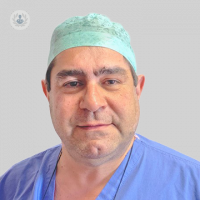The ins and outs of diverticular disease
Written by:As you get older, small pouches called diverticula can form in the lining of the intestines. They may not cause any problems and some people might never realise they have them. However, in other people, they can cause bothersome symptoms. This is called diverticular disease. Expert Mr Giovanni Tebala explains.

What does it feel like when you have diverticular disease?
In most cases, diverticular disease is asymptomatic and often people with diverticula of the colon are not even aware they have this disease. Unfortunately, some cases develop complications and symptoms.
The most frequent symptom is pain at the lower abdomen, usually on the left side, but sometimes also below the belly button or on the right. This pain can be associated with specific foods, such as milk, beans, peas, cauliflower or broccoli and may be relieved by passing wind or opening your bowel. Bowel habits can become more irregular, with alternating constipation and diarrhoea and sometimes explosive motions.
In a few patients, the diverticula become chronically inflamed and create a progressive stricture (abnormal narrowing) of the bowel, usually at the level of the sigmoid colon. This leads to worsening constipation and bloating.
Occasionally, diverticula can undergo acute inflammation (diverticulitis), which presents with localised stabbing pain, fever, generally feeling unwell and occasional bleeding. The acute inflammation can cause the perforation of one (or more) of the diverticula, with subsequent peritonitis. Patients with sudden onset of diffuse abdominal stabbing pain must seek immediate medical help.
Are symptoms similar to IBS?
In the initial phase of non-complicated diverticular disease, symptoms can be similar to those of IBS (irritable bowel syndrome). Occasional pain and discomfort at the lower abdomen and irregular bowel habits may prompt further investigations.
Is diverticular disease reversible?
No. Diverticula are small pouches that develop in the wall of the bowel (usually the large bowel) as a response to increased pressure within the bowel itself. Once they form, they are not reversible. The same is true for chronic diverticular complications, such as stricture of the bowel. If someone develops a stricture of the bowel as a consequence of their diverticula, it is not reversible and may need an invasive treatment. Conversely, acute inflammation of the diverticula can be reversible if properly treated.
What aggravates diverticular disease?
It is not perfectly clear why in some patients diverticular disease tends to get worse with time, whereas in other patients it may stay asymptomatic for their whole life. It probably has something to do with the so-called ‘gut flora’, that is, the community of bacteria normally living within our bowel and helping us with the digestive process. These bacteria can be affected by a poor diet and less-than-healthy lifestyle. It is generally accepted that a low-fibre diet with minimal fluid intake may aggravate diverticular disease and increase the risk of complications.
What foods and drinks should I be avoiding?
As the real cause of diverticular disease is not completely clear, there is no evidence-based list of food or drinks to be avoided. However, it is common experience that some items can stimulate symptoms and even increase the risk of complications.
You may wish to reduce your intake of dairy products, legumes, cabbage, broccoli, and cauliflower and increase your intake of water (at least 1.5 litres a day), fruit, vegetables, and whole grain foods. A high-fibre diet can help to reduce the risk of diverticulitis and other complications, but in the presence of an acute flare-up it is suggested to put the bowel at rest with a low-fibre diet (rice, fish, poultry, potatoes, etc.). Red meat and sugary food can increase the risk of diverticulitis.
Generally speaking, the most sensible advice is to adjust your diet to keep the bowel working as regularly as possible with soft stools.
For an appointment with Mr Tebala visit his Top Doctors profile.


